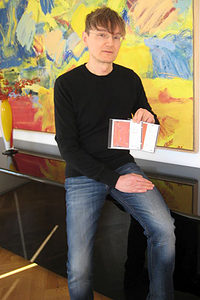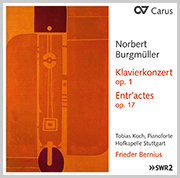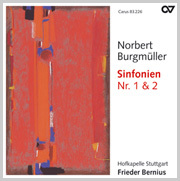Unknown But Highly Regarded
When asked to choose a favorite piece, at first Felix Loy felt like the famous question of what you would take with you to a desert island. When it comes down to it, there are ultimately just two works: Bach’s Magnificat BWV 243 and the orchestral works of Norbert Burgmüller.
When asked to choose a favorite piece, at first it felt like the famous question of what you would take with you to a desert island. Such thoughts always present me with great difficulty, at least as far as music is concerned, as there are simply too many masterpieces which are indispensable for me. But happily, this is just a contribution to a monthly column, and I can still keep all the other magnificent music which I have NOT chosen … When it comes down to it, there are ultimately just two works: Bach’s Magnificat BWV 243 and the orchestral works of Norbert Burgmüller. For me, the Magnificat is like a highly-concentrated essence of Bach’s compositional skill; in many passages, such as the Fecit potentiam, I can be certain that I will still get goose-pimples if I hear it a hundred times.
So I decided on something else. For Bach certainly needs less publicity than the still barely-known Norbert Burgmüller. There are probably very few rediscoveries of composers in the last decades which have been as surprising and fascinating – only Jan Dismas Zelenka immediately comes to mind.
Norbert Burgmüller (the younger brother of the pianist Friedrich Burgmüller, who may be familiar to some through his Etudes) was born in 1810, like Robert Schumann who regarded him highly and who, following Burgmüller’s death at the age of just 26, lamented: “After Franz Schubert’s early death, none could be more distressing than that of Burgmüller.” Fate is robbing us “of our best talents”. Schumann also completed the Scherzo of the unfinished Second Symphony. Mendelssohn, likewise, championed Burgmüller, particularly during his period as Music Director in Düsseldorf, as also did Johannes Brahms. Mendelssohn included Burgmüller’s Overture in F minor in concert programs, as well as the Piano Concerto in which he himself played the solo part. In a concert review of 1834 “the carefully thought-out originality and surprising novelty” of the First Symphony was much praised, “its clarity, alongside an unusual boldness and wealth of harmonies”.
But no amount of laudatory words can describe the actual music. But they can and should make you eager to hear these works which (unfortunately) fit on just two CDs. As well as the Piano Concerto and two symphonies, there is an overture and incidental music. Frieder Bernius gives his all to pay the greatest possible tribute to Burgmüller. The magnificent pianist Tobias Koch and the Hofkapelle Stuttgart make a considerable contribution to this success story; by using period instruments Burgmüller’s tremendous wealth of color is shown to its best advantage with particular sensitivity. Fantastic early Romantic music which deserves all the attention it can get. Try it out!
Dr. Felix Loy studied musicology and German language and literature. He has worked as a freelance editor, author, and adviser since 2012. He has been involved in music-making for almost his entire life, from his first experiences as the son of a church musician and his time at a specialist music school (boys’ choir) to the present, now playing the clarinet and recorder. Dr. Felix Loy is a freelance editor for Carus.






Leave a Reply
Want to join the discussion?Feel free to contribute!